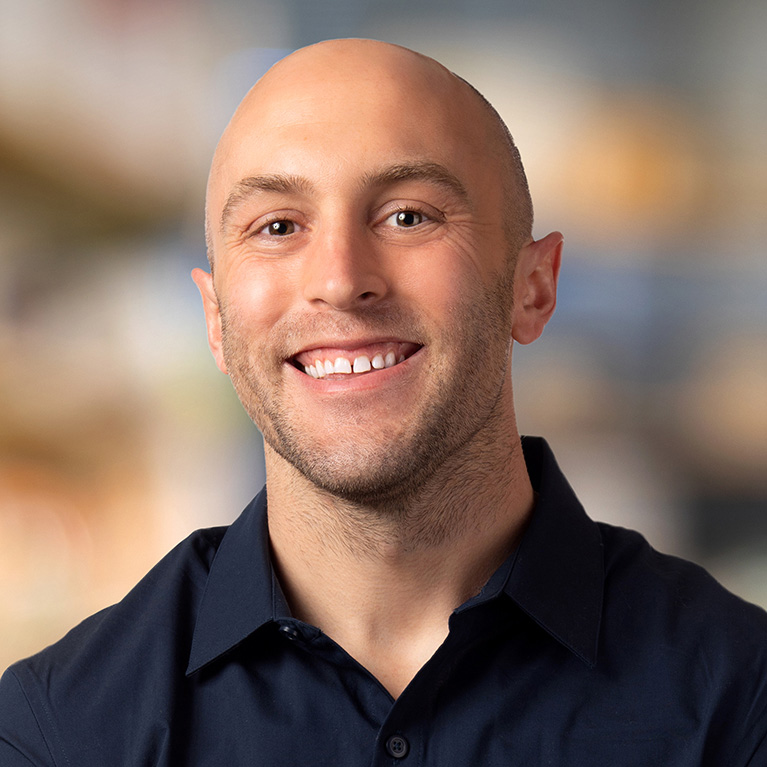I remember my dad when he
was coaching us in football,
we all made T shirts that
said effort is everything.
And that's really
also what I tell
the people that I train
in the lab is that,
you know, your effort is
everything in this mission.
My name is Daniel Hollern.
I'm an assistant professor at
the Salk Institute in
the Salk Cancer Center.
I grew up in Grand
Rapids, Michigan.
It's on the west
side of the state.
I grew up in a
very large family.
As the oldest of seven kids who
were all really connected
to our grandparents
and our cousins.
I played a lot of
sports growing up.
Really taught you how in
science you have to work
together as a team.
And everybody's
unique talents can be
leveraged to help
achieve much more.
And I thought that
those experiences were
critical for starting to
develop just the tendencies
that you need in life to
be a good leader but
also a good team player.
I remember coming to
my guidance counselor
after my grandfather was
diagnosed with cancer.
And I realized that I really
wanted to switch the focus
of what I was
studying and what I would
pursue in my career.
So yeah, at first I wanted
to be an orthopaedic surgeon,
but having my hero
diagnosed with cancer
and not knowing anything
about what might
happen to him and how
he ended up in this
place just really
created this emotional stir
that I just couldn't
be satisfied with
doing anything else but pursuing
the research that might
be able to help him.
When I was interviewing
for the PhD program
at Michigan State University,
which was where I was sure
I wanted to go because
I was going to buy tickets with
my grandpa and all
of those things.
During the interview,
we were going
around the table and
everybody was saying,
you know, what are their
plans for their PhD?
What were they going to do next?
And so we're going
around the table and
everybody's saying postdoc,
I'm going to postdoc.
But I didn't know
what a postdoc was.
I came into this field
just very naive.
I just knew I wanted to do
cancer research and
I was going to work
harder than I ever could to
make sure that that happened.
So I remember when it came
to me and I said I was going
to start a laboratory.
Everybody looked at
me like I was crazy.
The other faculty that were
there just thought I
was very ambitious.
But everybody else was like,
what is this guy talking about?
And so I remember they
had us with roommates.
And so I remember after dinner
I'm asking my roommate
what's a postdoc?
And he's telling
me what this is.
And I thought I was
doing that, like
I was not going to get an offer
to this PhD program.
I called my parents.
Now, it's like I
really messed up.
I got to, you know, prepare
harder for the next interview.
And I remember that
Monday when I got
the call that I was being
admitted into the program,
I just ran down the
driveway celebrating and I
couldn't wait to
tell my parents.
Couldn't wait to tell
my grandparents.
It was it was really a dream
come true that because I knew
that I had a foot in the door to
start this mission of
doing cancer research.
My research is really focused on
providing cures for patients
that currently have no options.
And the reason that I
believe that we can
do this is we all have
an immune system.
Some of our immune
systems work very well.
And other people, they have
dysfunctional immune systems,
and many of those people with
dysfunctional immune
systems have cancer.
What we need to do is
just really correct
these imbalances in
our immune system
and tell them how to start to,
again, recognize
these cancer cells
and take care of them and
eliminate them from the body.
The research to date and
the clinical outcomes are
showing that this is possible.
And my lab's research
is contributing to
this momentum by adding a new
ingredient to the equation.
We studied this other
immune cell that has
a very unique capacity
to educate T cells on
how to attack cancer.
But they also have
another way of bringing
in many other parts of the
immune system into the battle.
And their ability to amplify
an immune response and gain
much more coverage over
the targets that are
present on cancer cells,
makes them a very
unique vehicle and
opportunity to treat cancer in
a much more effective
and robust way.
We are really excited about
what our research
is telling us for
the potential and the future
of clinical cancer care.
And I really think that B cells
are going to be a critical
part of that equation.
And our research shows
that this is really key
to driving this very
effective anti tumor
immune response.

